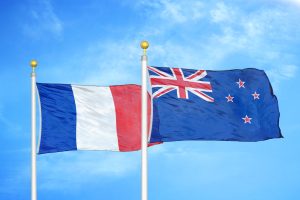As early as 2018, the main principles and objectives of France’s strategy for the Indo-Pacific were set out in a series of founding speeches by President Emmanuel Macron.
In this emerging space, which has become the world’s new center of gravity, France, as a nation bordering both the Indian Ocean and the Pacific, wants to act as a stabilizing power, committed to effective multilateralism based on the rule of law and the refusal of coercion. It intends to pursue a cooperative and inclusive approach that respects the sovereignty of all, without following a logic of blocs, in order to reduce the tensions posed in particular by the rise of China and to face global challenges collectively.
This approach, which also nourishes Europe’s strategy in the Indo-Pacific, is already embodied in numerous projects implemented in the region, from the east coast of Africa to the Pacific, in terms of maritime safety, connectivity, the fight against climate change and the preservation of biodiversity, as well as the prevention and management of natural disasters. In all these areas, France continues to play a leading role in promoting a European agenda for cooperation with the countries and organizations of the region, in which ASEAN plays a central role, alongside the Pacific Islands Forum.
At our initiative, a first EU-Indo-Pacific Ministerial Forum was organized in Paris last year, during the French Presidency of the Council of the European Union and in the presence of New Zealand Foreign Minister Nanaia Mahuta, in a format designed to foster a shared understanding of the issues at stake and to lead to concrete achievements. The forum, whose second edition was held on May 13 in Stockholm under the Swedish EU presidency, confirms the enduring commitment of the EU and its member states to their partners in the Indo-Pacific.
In this context, the excellent relations maintained by New Zealand and France offer new opportunities for our two countries to strengthen their cooperation and their joint contribution to the security and sustainable development of the region.
Indeed, a special bond unites France and New Zealand, forged not only by our shared history, but also by our deep connection to the environment and particularly to the oceans. In the pure spirit of Kaitiakitanga, Nice will host the 2025 U.N. Ocean Conference, to work toward the protection of the Moana/Ocean. We do share a common ambition: to protect this vital space, promote peace and cooperation in the Indo-Pacific region, and build a more sustainable world for future generations.
On the safety front, we celebrated this year the 30th anniversary of the FRANZ Arrangement, which aims to coordinate the operational response to natural disasters in the South Pacific between Australia, New Zealand, and France. This humanitarian assistance/disaster relief (HADR) mechanism has been activated almost 40 times since its creation, most recently during the passage of cyclones Kevin and Judy in Vanuatu in March. FRANZ has proved its effectiveness in deploying reconnaissance flights, as well as sending humanitarian stocks and relief units to disaster-stricken populations. The next step in the strengthening of the regional architecture now is to jointly encourage small Pacific Island states to play a greater role, by becoming full players in the operations carried out.
New Zealand’s and France’s contributions to regional maritime security are fully in line with a multilateral framework. Within the Pacific Quad, our two countries’ forces take part in maritime surveillance and security operations carried out in coordination with Australia and the United States. France also supports the promotion of European tools for information sharing and capacity-building in maritime domain awareness, as part of the CRIMARIO II program.
The recent signature by the New Zealand Navy and the Rescue Coordination Center New Zealand of an agreement to use the IORIS information exchange platform will facilitate the coordination of our actions, particularly in the fight against illegal, unreported and unregulated fishing.
In the field of climate change – another crucial issue for all Pacific countries – New Zealand and France are cooperating through the KIWA initiative. Managed by the French Development Agency (Agence Française de Développement), with its partners in the region, the EU and Canada, KIWA aims to improve the resilience of Pacific ecosystems, communities, and economies to climate change through concrete, on-the-ground solutions, in line with the 2050 Strategy for the Blue Pacific Continent adopted by the Pacific Islands Forum. KIWA is already supporting projects in 15 states and territories. Given its success, the initiative is set to extend its reach even further, thanks to the increase in our respective financial contributions.
We remain determined to explore new opportunities for cooperation, also in connection with the deployment of the EU’s Global Gateway strategy, in the fields of energy transition, connectivity, and digital technology. The free trade agreement concluded during the French Presidency of the EU is also a framework that responds to the need for economic resilience and diversification of our respective supply chains. This recent FTA fully meets our shared objective of promoting development that respects the environment, standards and corporate social responsibility, while enhancing Māori people’s participation in international trade.
New Zealand’s membership in the International Solar Alliance, which aims to promote the dissemination of knowledge and capacity-building in the use of solar energy, also opens up new opportunities for us to work together on projects and provide expertise in the field. As a potential model, France is funding the International Network of Solar Technology and Application Resource Centres (STAR-C) program in Papua New Guinea via the International Solar Alliance.
New Zealand and France’s shared commitment to multilateralism is reflected in their active involvement in all Pacific regional organizations, to which they provide significant political and material support. The current deepening of the French Development Agency’s cooperation with these institutions, from its regional headquarters in Nouméa, New Caledonia, should open up new prospects in the years to come for strengthening our joint contribution to regional architecture, and for pursuing a shared ambition with all our partners.

































